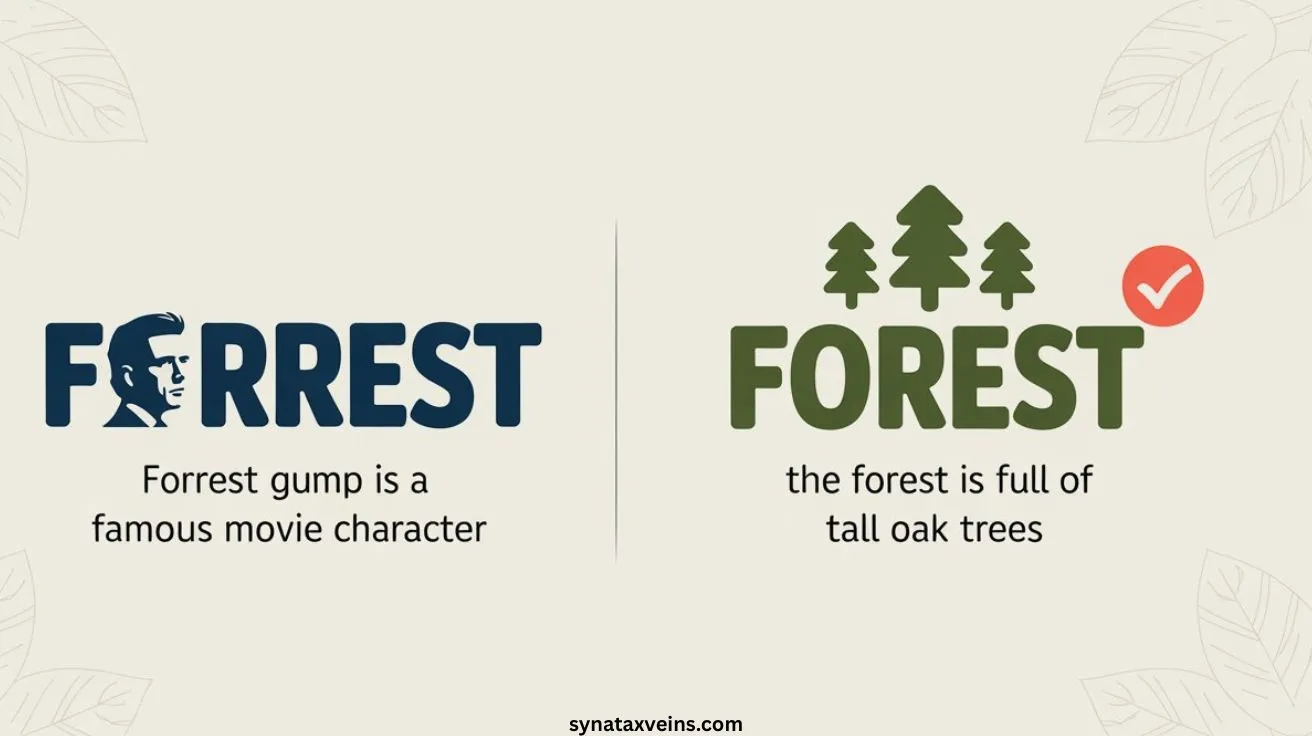If you’ve ever paused while typing and wondered whether it’s “forrest” or forest”, you’re not alone. Many people get confused because of the double “r” in “forrest,” but the difference is simple once you know the rules. In this guide, we’ll explain the correct spelling, common mistakes, famous examples, and tips to remember which one to use in writing and conversation.
Forrest or Forest: The Key Difference
The main confusion comes from the extra “r” in forrest. The correct spelling for wooded areas is forest, while Forrest with double “r” is usually a proper noun, like a person’s name or a location. Recognizing the context — nature versus a name — is the key to always getting it right.
Forest: Definition and Correct Usage
A forest is a large area covered mainly with trees and undergrowth. It’s used in science, literature, and everyday conversation to describe nature.
- Example: “The Amazon forest is home to thousands of species.”
- Example: “We spent the weekend hiking through the pine forest.”
Remember, forest always has a single “r” when describing natural landscapes.
Forrest: When the Double ‘R’ Is Used
Forrest with two “r”s is rarely used for nature. Instead, it appears in:
- People’s names: “Forrest Gump”
- Places: “Forrest Hill”
- Brands or institutions
Using forrest to describe trees or landscapes is a spelling error.
Forest vs Forrest: Common Mistakes
Many writers mix these two because they sound similar. Common mistakes include:
- Using forrest when talking about natural areas.
- Confusing Forrest with the common noun “forest.”
- Using forest incorrectly in names.
Pro tip: Always consider the context — nature = forest, name = Forrest.
Is It Forrest or Forest in Writing?
When writing, follow these simple rules:
- Use forest when describing trees, nature, or wooded areas.
- Use Forrest for names of people, places, or fictional characters.
Examples:
- Correct: “We went camping in the dense forest last summer.” ✅
- Correct: “Forrest Whitaker won an Academy Award for acting.” ✅
READ MORE >>> HY Meaning in Text: What It Really Means (2025 Guide)
Aerial vs Arial: What’s the Real Difference? (2025 Grammar Guide)
Real-Life Examples of Forest vs Forrest
| Word | Usage Example |
|---|---|
| Forest | “The Black Forest in Germany is a famous tourist spot.” |
| Forrest | “Forrest Gump is an iconic movie character.” |
| Forest | “We walked through a lush forest during our hike.” |
| Forrest | “Forrest Hill is a well-known neighborhood in Australia.” |
Forest vs Forrest: Usage Frequency Table
| Term | Usage Context | Approx. Frequency (2025) | Notes |
|---|---|---|---|
| Forest | Nature, landscapes | 95% | Correct spelling for trees, ecosystems, and natural areas. |
| Forrest | Names, locations | 5% | Proper noun only; examples include Forrest Gump or Forrest Hill. |
| Forest vs Forrest | Mixed usage mistakes | 10–15% errors in casual writing | Common mistake: using “forrest” for natural areas. |
Why People Confuse Forrest and Forest
The confusion often happens because:
- Phonetic influence: The double “r” sounds natural in speech.
- Pop culture exposure: Famous characters like Forrest Gump make “Forrest” more familiar.
- Typing errors: Quick writing often adds extra letters.
Understanding why this happens helps avoid mistakes.
Tips to Remember the Right Spelling
- Nature = single “r”: Always forest.
- Names = double “r”: Only for proper nouns.
- Visual cue: Think trees, greenery, wildlife for forest.
- Mnemonic: “One R for trees, two Rs for names.”
When to Use Forrest or Forest in Everyday Writing
If you’re typing a message, blog, or social media caption, ask yourself — am I talking about nature or a person? That’s your clue. “I love walking in the forest” is correct. “I met Forrest yesterday” is also correct. Simple, right? Knowing this difference makes your writing sound smart and confident.
Famous Forrests Around the World
- Forrest Gump — classic film character.
- Forrest Whitaker — Oscar-winning actor.
- Forrest Hill — popular neighborhoods in Australia.
- Forrest Road — streets in multiple countries.
These examples reinforce that Forrest is mainly used for names, not nature.
Forrest or Forest in Pop Culture and Names
In movies, books, and history, Forrest pops up as a first or last name. From Forrest Gump to Forrest Whitaker, this spelling has become iconic in pop culture. However, when you’re writing about national parks, woodlands, or ecosystems it’s always forest, not Forrest.
FAQs About Forrest or Forest
1. Is it Forrest or Forest when talking about trees? It’s always forest. “Forrest” is a proper noun.
2. Why do people write “forrest” instead of “forest”? Confusion comes from phonetics, pop culture, and typing errors.
3. Can “Forrest” ever mean a forest? No. “Forrest” is primarily a name; using it for trees is a mistake.
4. How do I remember the correct spelling? Mnemonic: “One R for trees, two Rs for names.”
5. Are there famous “Forrests” in real life? Yes — people like Forrest Whitaker and locations like Forrest Hill.
6. Is “forest” ever capitalized? Only if it’s part of a proper name, e.g., Black Forest.
Conclusion
In short, if you’re talking about trees, nature, or landscapes, always stick with forest — just one “r” keeps it correct and simple. On the other hand, Forrest with double “r” is reserved for names, famous characters, or specific places. It’s easy to mix them up, especially with pop culture references like Forrest Gump, but remembering this quick rule — nature = forest, name = Forrest — will save you from common spelling mistakes. Next time you write, pause for a second, check the context, and you’ll always get it right. Writing confidently has never been this easy!

